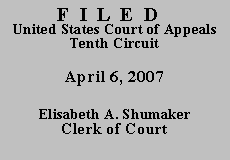

| RAYMOND CLARK,
Petitioner-Appellant, v. ALAN UCHTMAN, Warden; THE ATTORNEY GENERAL OF THE STATE OF NEW MEXICO, Respondents-Appellees. |
(D.C. No. CIV-05-1338 WPJ/WDS)
|
Raymond Clark appeals the district court's denial of his 28 U.S.C. § 2254 petition, in which he argued that his conviction for first degree murder of a peace officer should be vacated because he was denied effective assistance of counsel and because he is actually innocent.
Mr. Clark previously filed a § 2254 petition in 1990, in which he challenged the same conviction. The district court denied relief on the merits, and this court affirmed. See Clark v. Tansy, No. 91-2191, 1992 WL 102546 (10th Cir. 1992) (unpublished).
A district court does not have jurisdiction to address the merits of a second or successive petition until this court has granted the required authorization under 28 U.S.C. § 2244(b)(3)(A). See 28 U.S.C. § 2244(b)(3)(A) ("Before a second or successive application permitted by this section is filed in the district court, the applicant shall move in the appropriate court of appeals for an order authorizing the district court to consider the application."); Pease v. Klinger, 115 F.3d 763, 764 (10th Cir. 1997) ("The district court had no jurisdiction to decide [the petitioner's] § 2254 petition without authority from the court of appeals."). The district court should have transferred the action to this court. See Coleman v. United States, 106 F.3d 339, 341 (10th Cir. 1997) ("[W]hen a second or successive petition for habeas corpus relief under § 2254 or § 2255 motion is filed in the district court without the required authorization by this court, the district court should transfer the petition or motion to this court in the interest of justice pursuant to [28 U.S.C.] § 1631."). At the very least, the court should have dismissed the petition for lack of jurisdiction. See Spitznas v. Boone, 464 F.3d 1213, 1227 (10th Cir. 2006) ("Since the claim was successive ... the district court ... could only dismiss the petition or transfer it to us for certification.").
However, we will construe the pleadings filed in this court as a request under § 2244(b)(3)(A) for authorization to file a second § 2254 petition. Id. at 1219 n. 8 ("Of course, consistent with our prior practice, we may, but are not required to, exercise discretion to construe a request for a certificate of appealability as an application to file a second or successive petition, or vice versa as warranted in the interests of justice.") (citing to Pease, 115 F.3d at 764).
In order to obtain such authorization Mr. Clark must make a prima facie showing that satisfies § 2244(b)(2)'s criteria for the filing of another habeas petition. That section requires that:
(2) A claim presented in a second or successive habeas corpus application under section 2254 that was not presented in a prior application shall be dismissed unless--
(A) the applicant shows that the claim relies on a new rule of constitutional law, made retroactive to cases on collateral review by the Supreme Court, that was previously unavailable; or
(B)(i) the factual predicate for the claim could not have been discovered previously through the exercise of due diligence; and
(ii) the facts underlying the claim, if proven and viewed in light of the evidence as a whole, would be sufficient to establish by clear and convincing evidence that, but for constitutional error, no reasonable factfinder would have found the applicant guilty of the underlying offense.
Based on our review of the implied application, we hold that Mr. Clark has failed to make a prima facie showing that the successive petition satisfies the above requirements. He invokes no new rule of constitutional law made retroactive to cases on collateral review by the Supreme Court, and nor does he rely on any newly discovered evidence. His allegations of innocence are merely conclusory and not supported by any evidence whatsoever.
The district court order is VACATED, and the implied application for authorization to file another § 2254 petition is DENIED. This matter is DISMISSED.
ENTERED FOR THE COURT
PER CURIAM
*.This order and judgment is not binding precedent except under the doctrines of law of the case, res judicata, and collateral estoppel. It may be cited, however, for its persuasive value consistent with Fed. R. App. P. 32.1 and 10th Cir. R. 32.1